by Lisa Cooke | Aug 25, 2015 | 01 What's New, Cloud Backup, Disaster Prevention, images, Inspiration, Listeners & Readers, Preservation, Publishing, Writing Family History
 It’s time (maybe past time!) to write your family history. Should you write a book or throw everything into a digital archive?
It’s time (maybe past time!) to write your family history. Should you write a book or throw everything into a digital archive?
Recently Joyce attended a genealogy conference I taught that was sponsored by the Central Arkansas Library System. She wrote to us that she went home with a newly-resolved plan for how to write her family history:
“I thoroughly enjoyed hearing you speak. I learned a lot also. There was a question asked at the conference that I had also thought a lot about: how to leave your legacy to your family. With technology changing every day, I have decided that the old-fashioned way is probably the best. Technology will not change the fact that we can sit down to a paper book. So I will keep my CDs, DVDs, and flash drives; however, I will print out books for my family to have, whether they have access to the computer or not.”
A Combination Approach
I certainly agree that paper and books are certainly a solution for genealogical information being accessible for generations to come. I like a combination approach. Since paper can deteriorate and become damaged like anything else, having a cloud back up service (I use Backblaze) and digital items like flash drives is also a good plan.
Part of leaving a legacy also involves finding ways to share that help the next generations (particularly those not interested in research) understand the value of the family tree. That’s where a Google Earth “family history tour” or other innovative sharing comes into play. If you can click click, copy, and paste, you can create an exciting multi-media story that looks like a video game that will captivate the next generation! (Learn how to create a Google Earth family history tour in my 2-volume Google Earth for Genealogy CD). The combination of sharing the info in fascinating ways and preserving the info in reliable multiple formats is a comprehensive strategy for the future!
Resources
How Cloud Backup Helped One Genealogy Gem Get Closer to Living a Paper-Free Life
Recommended File Formats for Long-Term Digital Preservation
Why I Use and Recommend Backblaze Cloud-based Computer Backup Service
 Ready to make your own plan to write your family history and preserve it digitally? Share your resolve–along with this post–with someone else! Use the handy icons at the top of the page to share on Facebook, Pinterest or your favorite social media site, or email the link to this article to a friend. Thanks!
Ready to make your own plan to write your family history and preserve it digitally? Share your resolve–along with this post–with someone else! Use the handy icons at the top of the page to share on Facebook, Pinterest or your favorite social media site, or email the link to this article to a friend. Thanks!
by Lisa Cooke | Oct 17, 2016 | 01 What's New, Blogs, Listeners & Readers, Writing Family History |
Creating and maintaining a genealogy blog is a fun and rewarding way to share your family history. Blogging is also effective in finding cousin connections! If you are worried your blog isn’t pulling in the cousins you expected, elevate your ranking in search results by implementing these 3 ways to improve your genealogy blog.

I recently received this exciting email from Ruth:
“Thank you, thank you, thank you! Several months ago, I attended one of your all-day seminars in Bossier City, Louisiana and I must thank you for motivating me!
I’ve been researching my family tree off and on for 25 years or so, and at times it has taken a back burner to whatever was going on in my life; only to be dusted off when I would get an inquiry or perhaps when someone in the family passed away. In the last 3 years, I have been attending these local seminars with a distant cousin. They were fun and I learned a few things, but none had generated the enthusiasm that I have at the moment!
The knowledge that you share and the easy manner in which you deliver your presentations are so down-to-earth and it inspires me to learn more. I left your seminar with a Premium Membership package and I have been listening to your podcast ever since.
You also encourage your readers to blog about their genealogy. I took your advice and I’ve done just that. Please take a look at my blog – any suggestions you might have would be welcomed. The title is My Family Tree: Hobby or Addiction? and I have dedicated it to my father who passed away in 2005! Here is the link: http://myfamilytreehobbyoraddiction.blogspot.com/
Thank you again for all you do that encourages us and for the new tools that you share with your listeners to help their journey along the way!
Many thanks,
Ruth Craig Estess”
Ruth, thank you and congratulations!

I love hearing how you have put it into action what you learned at the seminar.
Tips for Improving Your Genealogy Blog
Ruth is doing a terrific job including family information on her genealogy blog that others might be Googling. That means they are very likely to find her. But there’s more that can be done. Here are 3 additional tips for Ruth and anyone who wants to get more traction with their genealogy blog:
“1. Add more images. Google looks postively upon websites that have images. It considers the website to be more of an authority on the subject covered in the blog. Images improve Search Engine Optimization (SEO.) In layman’s terms, SEO refers the ways in which you have made your blog easy to use, and easy for Google to understand what it is about. The better Google understands the subject, the better chance it has of delivering your blog as a result when people search on things you write about (like your family tree!) It’s important that your image files have names that accurately reflect what they and your blog post are about. Therefore, it’s a solid strategy to include relevant genealogical information such as names, places and dates in the image titles. If you don’t happen to personally have photos about the subject of your blog post, include images of documents or other related items.
2. Include a Call to Action. At the end of each post, invite your readers to comment and contact you if they are researching the same family. It’s amazing what a little invitation will do to prompt interaction. If you skip this step, your readers may just “lurk”, or in other words, quietly read and then go on to the next website. That’s a missed opportunity for connection and collaboration. Even though a reader may be researching the family you are writing about, they may not think to reach out to you or comment unless you prompt them to do so.
3. Make use of blog categories. Categories and Labels help organize you blog content. Create a category for each surname you discuss on your blog. The category can appear in the side column on your blog. That makes it easy for readers to click a surname they are interested in and jump directly to your posts that discuss that name.”
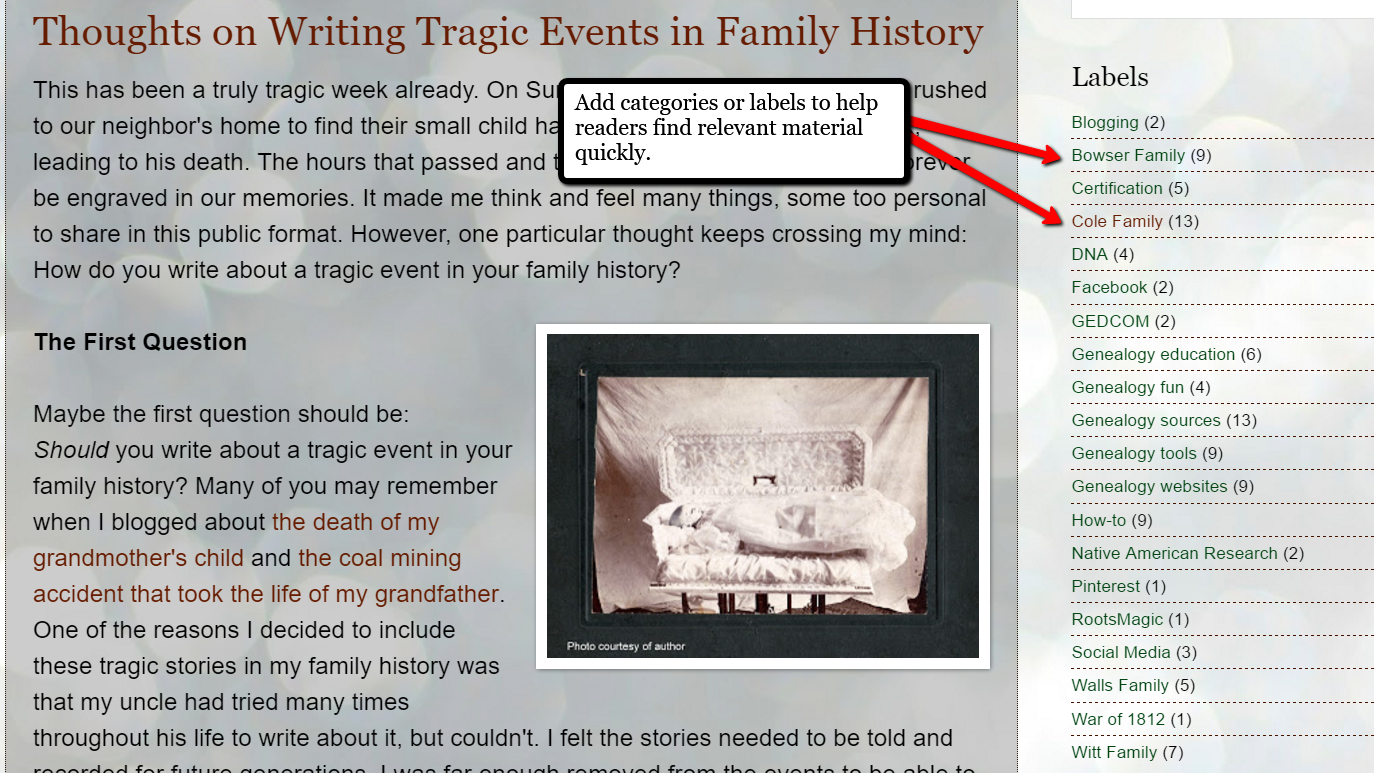
Categories and Labels are great for SEO too. Google loves well-organized websites because they are easier to understand and deliver in search results.
More Gems on Creating Your Own Genealogy Blog
Ruth wrote to tell me she has already started putting these ideas into practice. She’s on her way to rising in the search results and hearing from distant cousins. How exciting! Click below to continue reading about rewarding and effective family history blogging.
Why Marketing Experts Would Agree That You Should Write a Family History Blog
Why and How to Start a Family History Blog
Genealogy Blogging, the Future of Genealogy and More
Tell Us About Your Genealogy Blog
Do you have a genealogy blog? Well, here’s my call to action! Please share your family history blog, SEO tips, and success stories in the comments area below.
And I would so appreciate it if you would share Genealogy Gems with your friends and blog readers by including a link to our website in your list of favorite genealogy help sites on your blog. Thanks!
by Lisa Cooke | Mar 14, 2016 | 01 What's New, Conferences
Lisa Louise Cooke will be presenting the all-day 2016 Spring Seminar for the Bend Genealogical Society in Oregon on Saturday, April 23. 
Beautiful Bend, Oregon is not only a sought-after vacation destination, but a hub for enthusiastic genealogists. Join Lisa Louise Cooke at the 2016 Spring Seminar for the Bend Genealogical Society on Saturday, April 23, 2016. Her presentations will include:
- Get the Scoop on Your Ancestors with Newspapers — Yearning to “read all about it?” Newspapers are a fantastic source of research leads, information and historical context for your family history. Learn Lisa’s approach to achieve success in locating news about your ancestors.
- Genealogy Podcasts 101 — Learn everything you need to know about how to find and listen to genealogy and history podcasts.
- Time Travel with Google Earth — Experience historic maps, images and videos coming together to create stunning time travel experiences in the free Google Earth program.
- Inspiring Ways to Capture the Interest of the Non-Genealogists in Your Family — Learn how to capture the imagination of your non-historian friends and relatives. Lisa’s projects are guaranteed to inspire your family to ask you to tell them more about the family tree!
WHAT: Lisa Louise Cooke at Bend Genealogical Society 2016 Spring Seminar
WHEN: Saturday, April 23, 2016, 9am – 4pm (registration and coffee service open at 8:30)
WHERE: Bend Golf & Country Club, 61045 Country Club Dr, Bend, OR
REGISTER: Click here to download PDF with details
Your registration includes a syllabus, all-day coffee and tea service and a choice of a luncheon salad. Registration is required because seating is limited.
 Can’t make it? Get a free taste of one of Lisa’s lectures by clicking here to watch a free video introduction to using Google Earth for genealogy. See how to harness the power of this free technology tool to understand the world your ancestors lived in. These tips come from Lisa’s popular Google Earth for Genealogy Video tutorial series, available as a digital download or on a 2-DVD set.
Can’t make it? Get a free taste of one of Lisa’s lectures by clicking here to watch a free video introduction to using Google Earth for genealogy. See how to harness the power of this free technology tool to understand the world your ancestors lived in. These tips come from Lisa’s popular Google Earth for Genealogy Video tutorial series, available as a digital download or on a 2-DVD set.
by Lisa Cooke | Aug 14, 2017 | 01 What's New, Court Records, Records & databases
Lydia thinks her great-grandfather was murdered–perhaps even by her grandfather! Here’s some advice for her and everyone researching “cold cases” for criminal ancestors on your family tree.
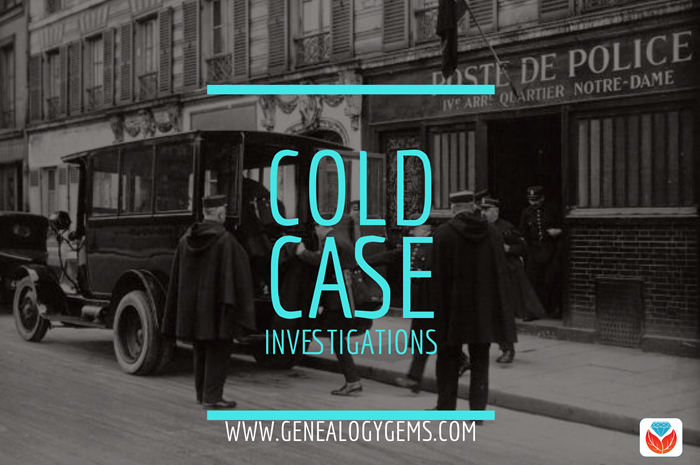
I heard recently from Lydia with these intriguing questions:
My great great grandpa William John Gabriel Nelson disappeared one day, never coming home from work. It was family lore that he had been “shanghai’d.” But even as a child the story didn’t add up. [Through a] few other mentions of the account throughout the years, and recently reconnecting with cousins through Ancestry.com/DNA and your advice to just email DNA matches, I have a growing reason to believe my great-grandfather was murdered. An even bigger fear is that my grandfather may have been the one to do it.
All parties involved with this are now dead, so follow-up is impossible with them. But I’m wondering about contacting the Los Angeles Police Department (LAPD) or the library to determine if indeed there was a cold case, missing persons report or John Doe. Since this happened in the mid 1940’s, would I contact the LAPD or is this now a job for a historian?
As a citizen, Lydia can certainly contact the LAPD here. It might take a bit of persistence to get to the right person or resource. I would start by asking for how you can find out the status of a cold case from the year in question.
Here are 4 ways to follow up on your own criminal ancestors’ cold cases:
1. Look for cold case files online.
As I often say, all good searches start online because they will help you prepare to go offline. In other words, not everything is online, but searching online first will give you a lay of the land, revealing what is available, who to contact, and where to go in person. Start with a Google search such as LAPD cold cases. The search results include several good leads:
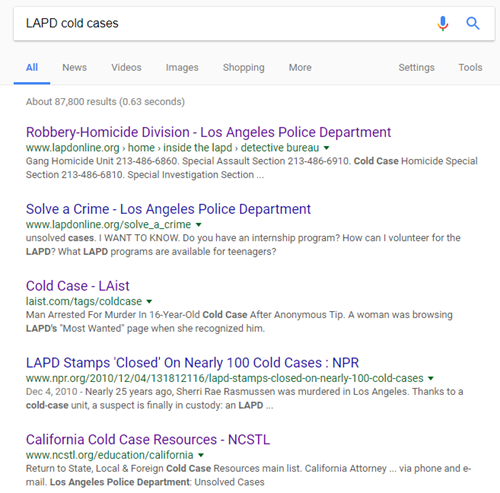
With a case like Lydia’s that is over 70 years old, I wouldn’t expect to pull it up in an online database (though you never know!) But I do see several sites here that provide phone numbers to gain access to those who can lead you in the right direction.
2. Search Google for clues.
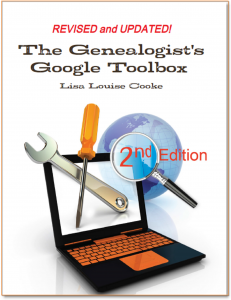 Use Google’s powerful search technology to look for online mentions of the names, places, and dates of your particular case.
Use Google’s powerful search technology to look for online mentions of the names, places, and dates of your particular case.
In Lydia’s case, she might begin with keywords relating to her great-grandfather’s disappearance, with his name, year, and the place he was last seen. Including descriptive keywords such as disappear, mystery, vanished or murder might also yield helpful results.
Learn more about effective search techniques in my book, The Genealogist’s Google Toolbox, Second Edition.
3. Check old newspapers.
Newspapers in your ancestor’s hometown (or further afield) may have mentioned the incident. With a common name like William (or Bill) Nelson, you may need to weed out the overabundance of unwanted results you get. Let me show you how I did this in
GenealogyBank, a popular genealogical newspaper website:
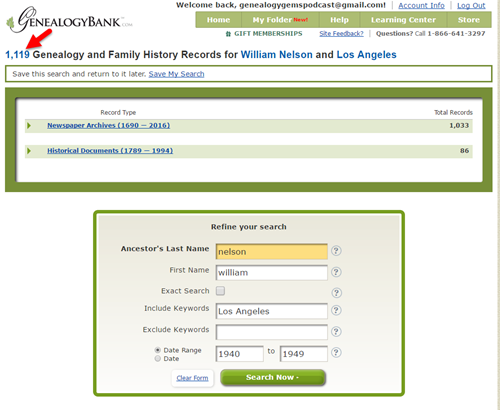
The initial results of searching GenealogyBank (above) for the terms William Nelson and Los Angeles brought up over 1,000 search results! (The red arrow points to the tally.) Since I don’t like wasting valuable research time on irrelevant results (who’s with me?!), I refined the search. I specified Nelson as a last name, William as a first name, Los Angeles as a keyword, and I added a date range: the decade during which he disappeared. Next, I limited my search to Los Angeles-area newspapers, shown below:
This search narrows results down to under 200: a robust number, but at least manageable to look through for relevant material.
I want to be able to use these same search parameters in the future, so I click
Save My Search. The search now appears in
My Folder for future reference.
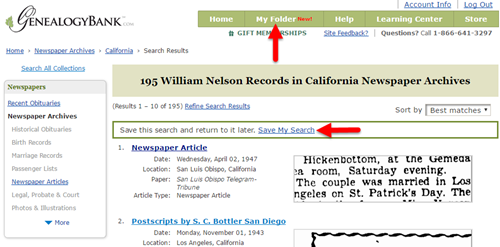
4. Look for criminal records.
 If you knew (or suspected) that a relative was prosecuted for a crime, it’s time to start looking for records relating to the criminal case. There may be several kinds:
If you knew (or suspected) that a relative was prosecuted for a crime, it’s time to start looking for records relating to the criminal case. There may be several kinds:
- In cases of suspicious death (where there was a body, unlike Lydia’s case), look for any surviving coroner’s records.
- If a trial may have occurred, research the jurisdiction to find out what court would have handled it, and then look for files relating to the case.
- If an ancestor may have served time, look for prison records. Genealogy Gems Premium podcast episode 29 is devoted to the topic of prison records.
Get inspired!
Read this article about a woman who was researching not one but two mysterious deaths on her family tree.
Want to help investigators lay to rest their own cold cases?
Click here to read about the Unclaimed Persons Project and how you can help.

by Lisa Cooke | Jan 11, 2017 | 01 What's New, Military, Newspaper

Wikimedia Commons image; click to view.
What did your relatives experience during World War II? Look for answers with these step-by-step instructions for finding WWII newspaper content and tips for searching about the war progress in the 1940s.
We have covered so many gripping and inspiring World War II stories in recent months (such as this one), it makes me want to learn more about what happened to my own family. Newspapers are the first place I look for everyday news happenings. But for the 1940s, newspapers in the U.S. and some other places are still copyright-protected–meaning not so widely available online for free–and of course, millions of local newspaper pages are not digitized online yet.
Try these 3 steps for finding and accessing 1940s newspaper content:
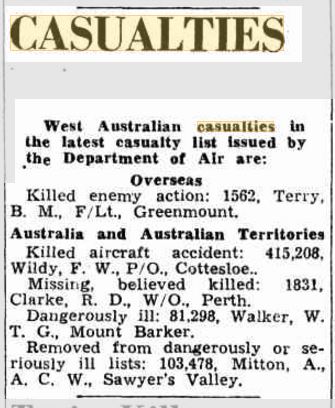 1. Understand what WWII newspapers may be available online
1. Understand what WWII newspapers may be available online
The major U.S. site for free digitized newspaper content, Chronicling America, recently started allowing post-1922 news, but it will take a while for copyright-cleared issues to post to the site (read more here.) Various state or local collections may vary; for example, the free Colorado Historical Newspaper Collection does have some WWII-era coverage.
Outside the U.S., Australia’s site Trove (which is free) does have digitized newspapers that include articles, like the 1942 casualty list from The Daily News (Perth), shown here. So do the overlapping British Newspaper Archive site and Findmypast.com’s British newspapers collection.
2. Explore premium and institutional databases for WWII newspapers
Start with digital newspaper content at free sites and subscription sites to which you have access. Then follow up with a trip to your local library, which likely offers additional historical newspaper databases. For example, in the U.S., these may include Access NewspaperARCHIVE, America’s GenealogyBank, America’s Historical Newspapers, America’s News, Newspaper Source, and ProQuest Historical Newspapers. Sometimes, you can access these databases from home with your library card log-in; if not, you’ll have to go to the library. (Genealogy Gems Premium members: check out Premium Podcast episode #125 for more great genealogical resources at public libraries.)
In the U.S., even these databases may only have limited coverage, such as titles from major cities for the 1940s. ProQuest Historical Newspapers has the Atlanta Constitution, Baltimore Sun, Boston Globe, Christian Science Monitor, New York Times, Wall Street Journal, and The Washington Post. Though these may not give you small-town details and perspectives on your own family, you will get a sense of the progress of the war from the perspective of those who were living through it, and how the public was responding.
3. Search for individual WWII newspapers
If you can’t find digitized content you want, widen your net. Search for titles of all active newspapers in your family’s city during the war. In the U.S., do that with the U.S. Newspaper Directory on Chronicling America. The same directory links to thousands of library holdings. WorldCat.org has even more; run a follow-up search here on any titles you don’t see holdings for on Chronicling America. If you’re local to where your family lived or can visit there, you may find copies at the public library. If you’re not local, you may have to try to order microfilmed copies through interlibrary loan. Ask your local Reference Librarian for assistance.
 Next, Google search for individual newspaper titles online. Though no longer actively digitizing and indexing newspapers, Google News Archive can help you locate online content for specific newspapers. Click here to access its alphabetical listing of newspapers. You can also enter keyword-searches in the search box on that webpage for all the newspapers listed there.
Next, Google search for individual newspaper titles online. Though no longer actively digitizing and indexing newspapers, Google News Archive can help you locate online content for specific newspapers. Click here to access its alphabetical listing of newspapers. You can also enter keyword-searches in the search box on that webpage for all the newspapers listed there.
As needed, run a follow-up Google search using the newspaper title, city, state, and date range; for the latter, use the format “1941..1945” with two periods between the dates and no spaces. This helps to filter your date range to these specific years.
Learn more about Googling your ancestors in newspapers, websites, books, photographs, and more in my book The Genealogist’s Google Toolbox.
What’s next?
 My book How to Find Your Family History in Newspapers is your ultimate guide to this topic, with tons of step-by-step instructions, online resources, and finding strategies. And, stay tuned for our up and coming post “Finding Family History in WWII Newspapers: Narrowing the Results” for more instructions on digitally searching WWII newspapers for war-related stories.
My book How to Find Your Family History in Newspapers is your ultimate guide to this topic, with tons of step-by-step instructions, online resources, and finding strategies. And, stay tuned for our up and coming post “Finding Family History in WWII Newspapers: Narrowing the Results” for more instructions on digitally searching WWII newspapers for war-related stories.
 It’s time (maybe past time!) to write your family history. Should you write a book or throw everything into a digital archive?
It’s time (maybe past time!) to write your family history. Should you write a book or throw everything into a digital archive? Ready to make your own plan to write your family history and preserve it digitally? Share your resolve–along with this post–with someone else! Use the handy icons at the top of the page to share on Facebook, Pinterest or your favorite social media site, or email the link to this article to a friend. Thanks!
Ready to make your own plan to write your family history and preserve it digitally? Share your resolve–along with this post–with someone else! Use the handy icons at the top of the page to share on Facebook, Pinterest or your favorite social media site, or email the link to this article to a friend. Thanks!




 Can’t make it? Get a free taste of one of Lisa’s lectures by
Can’t make it? Get a free taste of one of Lisa’s lectures by 



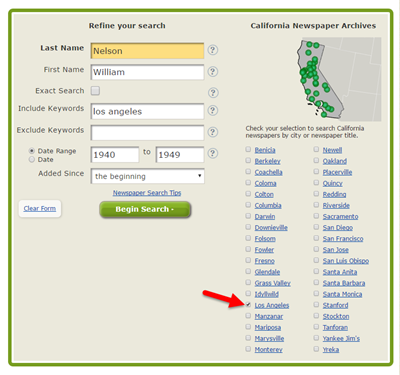




 1. Understand what WWII newspapers may be available online
1. Understand what WWII newspapers may be available online